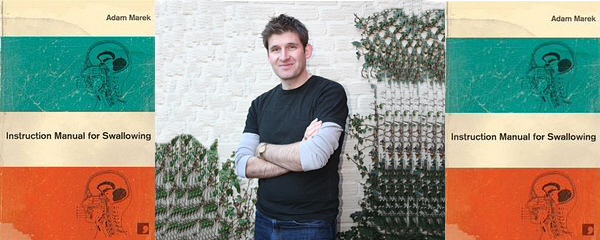
The prize-winning short story writer Adam Marek will be live and online, from 7:00 p.m. tonight, for our very first Live Question and Answer session. All registered members of the Forum are invited to join us online and quiz Adam about his weird and wonderful stories, winning competitions, and getting stories into print.
Since 2003, when his story ‘The 40-Litre Monkey’ was chosen as a supplementary winner in the Bridport Prize, Adam Marek has gained a reputation as being one of the UK’s best young short story writers. The following year, his story ‘Bobby and Sun-Li’ was runner up in the Douglas Coupland Award, and in 2005, he returned to the Bridport, winning 2nd prize for ‘Robot Wasps’. Instruction Manual for Swallowing, his first collection of stories, was nominated for the Frank O’Connor Prize in 2007, and this year, his haunting story ‘Fewer Things’ was shortlisted for the Sunday Times EFG Private Bank Short Story Award.
All registered members of the forum are invited to join Adam at 7:00 p.m. Please use the comments box, below, for submitting your questions. Questions will be posted onto the system, one at a time, by the Thresholds moderator.
For those unable to attend, questions can be submitted in advance using the comments box facility. For reference purposes, the session will remain available from our blog and in the Q&A archives.
Read Adam Marek’s story ‘Fewer Things’ here.
Listen to Adam read ‘The 40 Litre Monkey’ and ‘Testicular Cancer vs the Behemoth’ at Comma Press, here.


A big THANK YOU to all who took part in this LIVE event – to Adam, Alison, and each and every one of you who submitted questions and were here supporting us on the night.
As this was our first Live Q and A session, we didn’t really know what to expect, but the glitches we discovered will help us in organising our next Q and A session. Thank you again for your keen interest and your patience on the night.We will be making announcements, soon, about our next LIVE session.
Thank you very much, Adam. You’ve been a great guinea pig. And thanks, too, for agreeing to stay late. It’s been a bit of a mad evening, with questions filling up my inbox, but I think we got to everyone in the end.
It’s been fun, thanks all for your questions. I learned all kinds of things about myself that were a mystery until now 🙂
Thanks so much Adam! This has been really interesting.
And thanks Loree too.
Katherine and I have similar questions, here. At the Small Wonder Festival, last month, you said that a lot of your stories begin with a ‘collision of two different ideas’. I wonder if you might expand on this for our readers, here, and also comment about whether or not this is something you have any control over – i.e. does inspiration just strike you with a story, or is this ‘collision’ something that you can instigate? Katherine wants to know if this collision of opposites was something you discovered early on in your career or if it’s something that developed over time.
this will sound quite esoteric, but I have a sense for what one of my stories should feel like. I get lots of ideas everyday, and I record every one, whether it’s terrible or not – I carry a notebook and pen everywhere – I even have a crayon in the shower for writing on the tiles. Usually, one of these ideas is not enough on its own – it’s one dimensional. But if I feel excited about it, I keep it in mind, and then compare against it every other idea that comes to me. When I find an idea’s perfect pair, the story suddenly looks and feels like one of mine. It comes to life. It’s not a rational process, but intuitive.
I find the hardest part of writing short stories is coming up with a title. Do you have any suggestions?
I think a title has to be memorable, so that if (hopefully) people talk about the story, they refer to it by its name, rather than, ‘that one about the…’ So simplicity is good. Something like ‘The Lottery’ is a ‘does what it says on the tin’ title, and perfect.
My stories feel naked until they’ve got their title – sometimes the title comes early on in the process, and having it there at the front of the story makes me feel like the rest of it will go okay. I find if I get to the end of the story and I still don’t know what to call it, then I really struggle.
My advice, don’t finish the story without a title you’re happy with.
Thanks – great suggestion.
Hi Adam, I know you’re writing a novel at the moment as well as short stories – but is the thrill you get from writing the same no matter what form you’re writing in or is there a difference?
Hey there Andrea. When the writing is going well, both the novel and the short story are equally pleasurable. When it’s going badly, the pain with the novel is about a hundred times worse. Moments of crisis in a short story are usually quite quick to resolve – solve it or bin it. I’ve been working on my novel for three years now – on the days where it’s not working, and I wonder whether I’ll ever fix it, I face the possibility that I’ve wasted all that time.
Yeah, novels sound tough! With short stories do you feel a constant pressure to push boundaries and try new things?
The pleasure is in pushing boundaries and trying new things. Whenever anyone sits down to write, they have the pressure of the whole history of literature at their back. If you’re going to write something, you’d better not write something that already exists. Finding unexplored territory, or a new way to write about familiar territory, is essential.
Writers as explorers… thanks Adam. Am intrigued by the collision of two ideas for your stories too – fantastic. Thanks and good luck with your novel and future short stories. Thanks Loree!
Hi Adam
If you were a shape, what shape would you be?
An oxymoronohedron.
Hi Adam, I’ve read and enjoyed lots of your stories and wondered how you get started on a story because often there seems to be a strong metaphor coming across. Is it that or something completely different?
Thanks
Amanda
Thanks Amanda. The most important thing for me is that however odd the situation I put my characters in, it has to be about something real and everyday, a common human experience. I’ll usually start with clashing two things together that don’t naturally belong together (testicular cancer and godzilla for example) and then try to think what this might represent in my actual experience – (in that case, the relativity of misfortune – the protagonist in that story finds out he has testicular cancer on the day when godzilla attacks the city he lives in, and he has to wrestle with this event overshadowing his terrible news).
Hi Adam,
As a reader and as a writer, I love the way your stories fuse the surreal with the everyday… I guess I’m thinking of stories like ‘The 40-Litre Monkey’, ‘Instruction Manual’, etc. They’re brilliantly original. What draws you to this kind of story? Are they hard to write? And have any other writers inspired you in this territory? (I’m getting greedy with my questions. Just pick and choose!)
Alison
Thanks Alison! The best bit of writing advice I ever heard was ‘write the story you’d most like to read, but that hasn’t been written yet’ – the stories I like to read most are the ones that bend reality while keeping a firm foot in reality, if you see what I mean.
So I’m a big fan of writers like Haruki Murakami, JG Ballard, Will Self and Karen Russell who all work in that territory.
Are they hard to write? Hmmm, they’re fun to write. And I feel a big sense of freedom with them, because my style of writing means I can take the story in a very lateral direction. I don’t find the actual writing part hard, because before then, I’ve always planned them out in my head. The tricky part is the planning, before my fingers get anywhere near a keyboard.
Okay, then, here’s a question that was sent to me this morning. Ellie Piddington asks: As a successful short story writer, what does the short story mean to you? Furthermore, what do you feel are the key elements of short story writing?
In answer to Ellie’s question, it’s quite difficult to define what makes the ideal short story – its beauty is its versatility. Everything from one of Etgar Keret’s 2-pagers to a monster like Kafka’s Metamorphosis are classed as short stories. There’s a huge freedom with them, in terms of length and content. That’s one of the things that I like about them, the rules are few. You can get the reader to suspend their disbelief much further with a short than with a novel. But when I’m writing a short, there are certain rules I’ve set for myself: it has to have at least one surprise in it somewhere; keep it simple; make it believable and tangible, especially when it’s about something unbelievable; and for goodness sake never be boring.
Hi Loree, thanks for having me over for your first Q&A. I spent my whole childhood in a experimental facility, so being a guinea pig makes me feel kind of nostalgic 🙂
Hello Adam, quick question before reading bedtime stories to my kids! Have you ever abandoned a short story, or do you manage to turn every idea into something worthwhile?
Hi Juliet. Oh yes, I’ve abandoned lots of stories. I’m thinking about abandoning the one I was working on this morning in fact. Sometimes ideas look very shiny to start with, but then don’t live up to my expectations. I’ll only finish a story if I can stay excited about it for eight drafts or so.
My wife is always the first person to read my stories, and unless I can imagine her loving it, I won’t finish it.
That sounds intriguing…perhaps we can chat more about that later. First of all, I need to let people know that they are going to have to hit their REFRESH buttons now and again to see the conversations….
Hi there Adam, and Welcome to Thresholds. How does it feel to be our guinea pig?
I know ‘Where do your ideas come from?’ is a tired old question, but … where did the idea for the 40-Litre Monkey come from?!
Hi Katherine. 40-litre monkey started differently to every other story I’ve ever written. It’s the only time where the title came first. I was sitting at my desk one day, and it just came into my head. I wrote it down and then the first line followed right after, ‘I once met a man with a 40-litre monkey’. The rest of the writing was trying to find a context where that would make some kind of sense.
Thanks for that, Adam. Another question … Does it take you a long time to draft a story? Or is it something you write straight out, quickly, in a first draft, because you’ve planned it?
When I write the first draft, I’ll have a plan for where it’s going, so I tend to write it pretty quickly – a couple of weeks, say. I then spend a lot longer editing it. I like to do the hard bit, planning it and coming up with the story, before I begin writing. The idea is most fluid before you go anywhere near it with a keyboard.
I stopped reading “modern” short story collections because I felt they lacked passion, heart and a story, and found myself reading the masters again and again. After reading the stories on the links provided, though, I will rush to buy your book. I love your imagery. I have come back to writing (short stories/novels/poetry) after a long hiatus and I know that the best advice is to find your voice, and to keep reading and writing. More than that I think finding your confidence is key. My question is this: how did you find your confidence and did it ever waver? Thank you
Thanks Dora – and good question. I think confidence comes from trusting yourself. The great thing about short stories is that you are completely free to experiment. If you try something out and it fails, you’ve not lost more than a few weeks or so. Steve Jobs, the CEO of Apple, once said of business that if you want to double your success rate, you have to be willing to double your failure rate. I think it’s the same with fiction. If you try something and mess up, no one ever need see it – so, you cannot fail, publicly at least 🙂